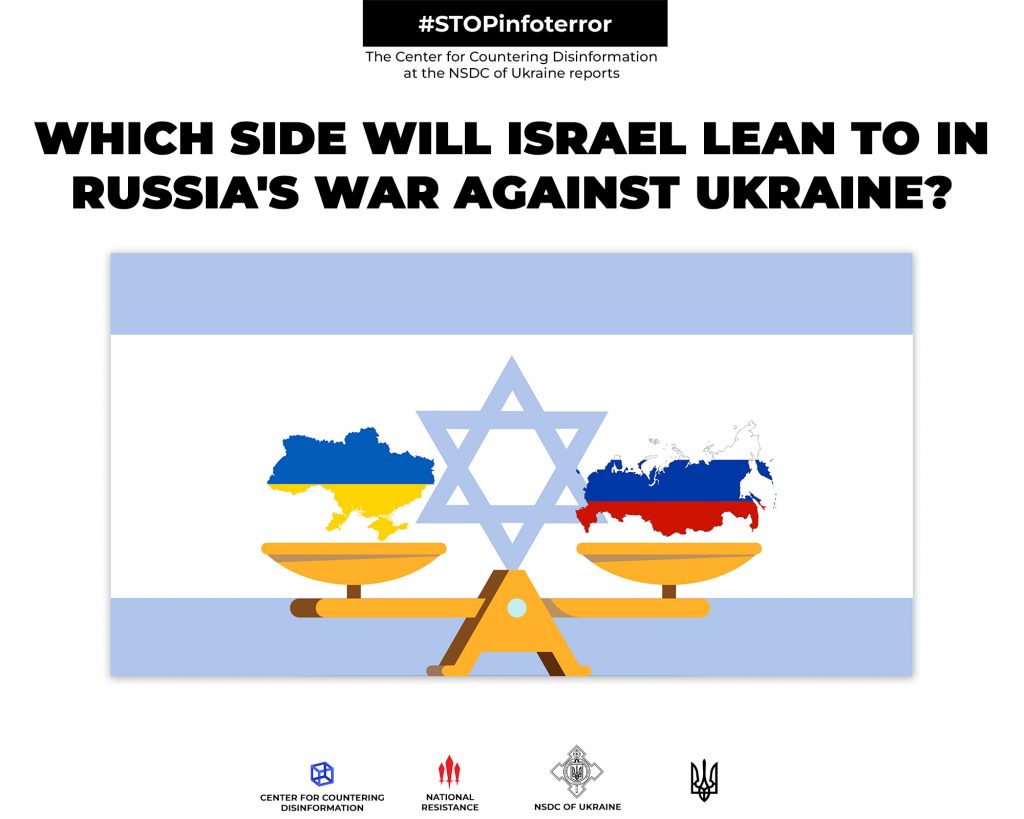The Center for Countering Disinformation at the National Security and Defense Council of Ukraine analyzes how russia’s war against Ukraine will affect Israel’s geopolitical positions.
Israel’s neutral position regarding the russian-Ukrainian war somewhat disappointed the Ukrainian society. Israel has not joined the Western sanctions, and no Israeli company has left the russian federation.
However, Israel agreed to act as a mediator in the negotiations between Ukraine and the russian federation and to participate in the humanitarian mission. As part of humanitarian aid, Israel sent ambulances and 230 tons of humanitarian cargo from its citizens to Ukraine.
Of course, Israel was concerned about the safety of its own citizens and repatriates from Ukraine. In addition, despite canceling the visa-free regime and attempting to quota Ukrainian migration, it still accepted about 15,000 refugees.
Israel’s interests do not always coincide with Ukraine’s since security in the context of Syrian or Iranian threats is more important for Israel than the war in Ukraine.
The disputed territory of the Golan Heights is now an informal border between Israel and russia. The lack of coordination with russia regarding “Syria’s desire to regain its territory” could cause problems. Another potential axis of Russian-Israeli contradictions is Israel’s hope to ensure gas exports to Europe through Turkey.
The reduction of the US role in the Middle East, russia’s military activity in Syria, and the nuclear agreement with Iran have radically changed the balance of power in the region. Hezbollah’s missile rearmament is a significant threat to Israel. After all, even the anti-missile “Iron Dome” does not guarantee safety in case of a massive missile attack.
However, rockets can fly not only from Lebanon but also from the Gaza Strip, Iran, or Syria, which are “humanitarianly assisted” by russia. Therefore, the Israeli leadership is trying not to quarrel with moscow to gain its support in the region.
Israel has political motives to stay close to russia, ranging from hopes that Moscow will refrain from signing a renewal of the Iran nuclear agreement, which has almost expired, to relying on russian influence to carry attacks on Iranian positions in Syria.
To avoid “aggravating” the Russian authorities, Israel blocked Ukraine from purchasing Pegasus spy software, which can hack any mobile phone, intercept phone conversations and allow remote listening. Also, Israel refused to sell its “Iron Dome” anti-missile defense system to Ukraine.
Due to sluggish diplomatic and informational cooperation for the last 30 years, Ukraine does not have the image we expect in the perception of Israelis. Moreover, many repatriates from Ukraine passed on memories of jewish pogroms and Soviet anti-semitism to their descendants. Ukraine’s recognition of the Palestinian state and repeated contradictions with Israel during the UN vote also do not help us to gain sympathy from the Israelis.
There are russian-language TV channels, radio stations, newspapers, and books in Israel that promote the narratives of russian propaganda, including that of Ukraine. Israelis’ powerful business lobby groups in russia and numerous russian billionaires of Jewish origin with Israeli citizenship influence government decisions and strengthen pro-russian parties in the country’s parliament.
Given the war in Ukraine, Israel expects significant demand for its military products. While NATO countries spend 2% of their GDP on defense, Israel spends at least 5-7%. In the recent five years, Israel has been holding 10th place in the sales of weapons and military equipment. Israeli defense industry accounts for 3% of the world’s arms turnover.
Israel exports 30% of its arms to Europe. In particular, given the russian aggression, Germany urgently allocated 100 billion euros for defense, including the purchase of unmanned aerial vehicles.
Despite political pressure from russia, Israel supported the resolution of the UN General Assembly and officially condemned russian aggression against Ukraine.
Due to Israel’s support of suspending russia from membership in the UN Human Rights Council, the russian Foreign Ministry brought back up the “Palestinian-Israeli conflict” in which “the Israeli leadership continues its illegal occupation and annexation of the Palestinian territories, where the Gaza Strip has become an open-air prison.”
Also, suddenly putin sent a personal letter to Israeli Prime Minister Naftali Benet and called to “return” Alexander’s Courtyard in Jerusalem to russia. At the same time, on March 3, the District Court of Jerusalem denied the illegal attempt to transfer the building to russia’s property, which does not belong to it, leaving it to the previous owner – the “Imperial Orthodox Palestinian Society.”
The Alexander Courtyard building in Jerusalem is next to the Church of the Holy Sepulchre. The Threshold of the Judgment Gate is situated there. It’s a fragment of the city gate through which Jesus Christ passed to Calvary. There is also the church of St. Alexander Nevsky, who is considered the patron saint of warriors and defenders in russia.
Demanding “Alexander Courtyard” is another lever of pressure on Israel to create a regional crisis in the Middle East.
After all, it was no coincidence that on the eve of the invasion of Ukraine, russia conducted demonstration flights of their aircraft in Syria. Based on that russian diplomats reminded Israel about the Golan Heights. Immediately after sending the letter to Israel, putin spoke with the Palestinian leader Abu Mazen, to whom he guaranteed support at all international forums.
The future victory of Ukraine is the guarantee of a peaceful sky over Israel free from racist missiles.










